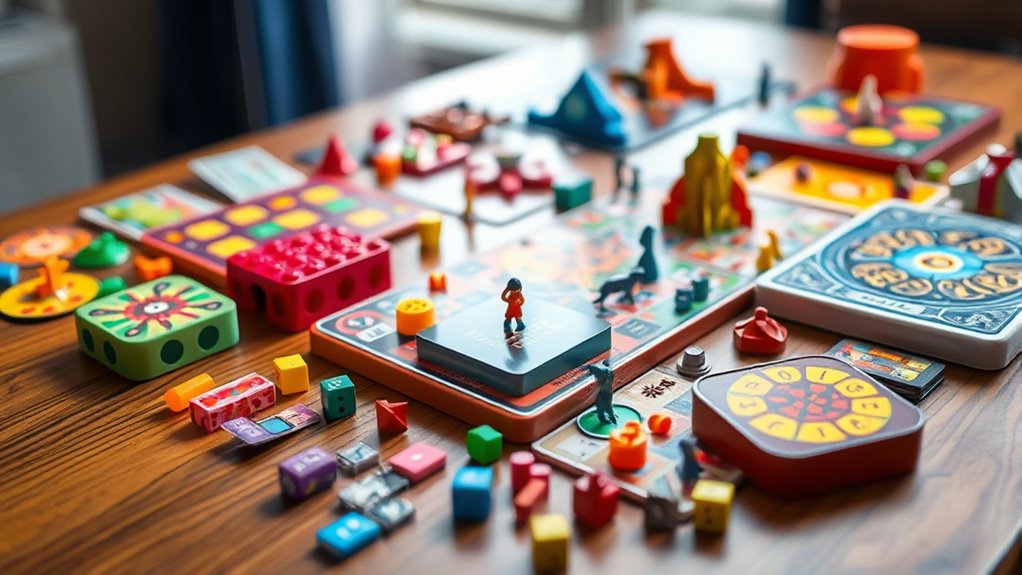If you’re looking for the best mental fitness board games in 2025, I’ve found 14 top options that boost brainpower, emotional resilience, and social skills. From games like Didax’s group activities to Head Rush for mindfulness, each offers unique benefits for all ages. Whether for therapy, classroom use, or family fun, these games support self-awareness, communication, and stress reduction. Stick around to explore how these engaging tools can help sharpen your mind and emotional health.
Key Takeaways
- Many mental fitness board games incorporate cognitive-behavioral techniques, mindfulness, and emotional regulation to improve brain health.
- Games like Head Rush and Feelings Builder promote social-emotional skills, self-awareness, and stress management for mental resilience.
- Versatile designs with engaging visuals and diverse themes support focus, memory, and critical thinking in players aged 5-12 and older.
- Some games are evidence-based and developed by professionals, ensuring effective mental fitness benefits.
- Combining playful activities with mental training, these games boost brainpower, emotional intelligence, and social skills in various settings.
Didax 500063 Social Skills Group Activities, 6 Board Games
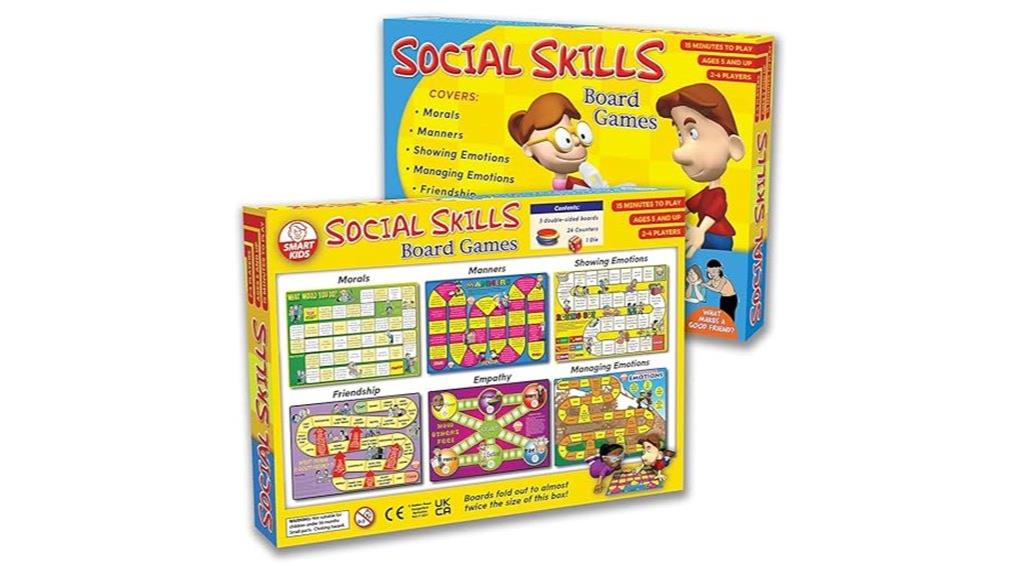
If you’re looking for an engaging way to develop social skills in children aged 5-12, Didax 500063 Social Skills Group Activities offers six versatile board games designed specifically for small groups. These games are both fun and educational, encouraging kids to improve communication, collaboration, and empathy. They target key social issues like manners, emotions, and friendship, making discussions natural and meaningful. I’ve seen how they help resistant children open up and practice appropriate responses. Perfect for counseling, classrooms, or home use, these games are a cost-effective way to foster social growth while keeping kids engaged and motivated.
Best For: children aged 5-12, educators, counselors, and parents seeking engaging and educational tools to enhance social skills and emotional understanding in small group settings.
Pros:
- Promotes collaboration, communication, and empathy through fun, educational games
- Easy to adapt to different social goals and suitable for children with varying needs
- Cost-effective alternative to professional programs, with multiple games in one set
Cons:
- Large box size may make portability and storage challenging
- Packaging can sometimes be damaged during shipping due to lack of protective materials
- Not a substitute for professional mental health treatment, only a supplementary tool
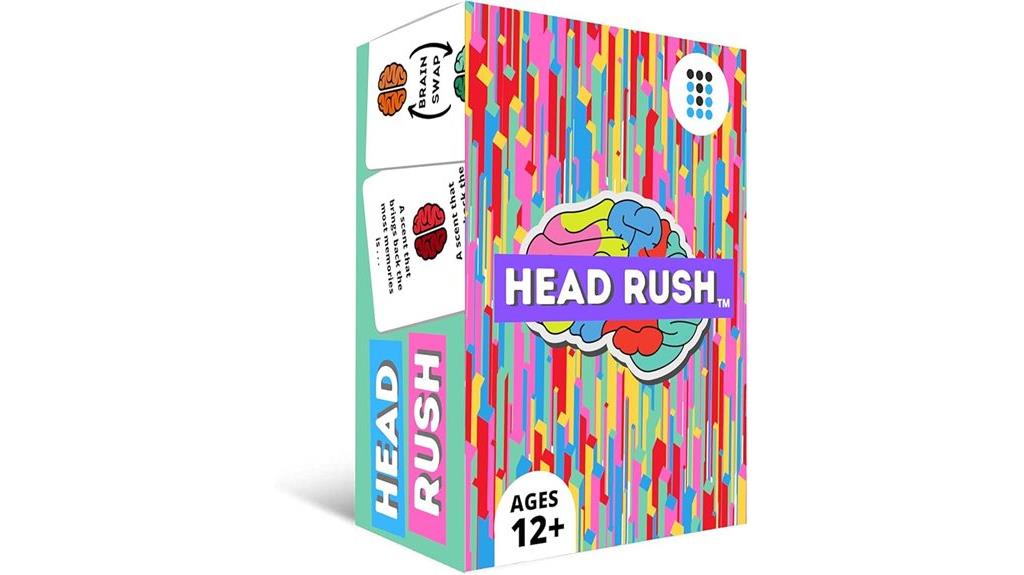
Head Rush stands out as an excellent choice for therapists, educators, and parents seeking to enhance social skills, mindfulness, and communication in a supportive setting. Designed for ages 12 and up, this game encourages open conversations on tough topics, fostering self-awareness and empathy. Its versatile use in group or individual sessions makes it ideal for therapy, school counseling, or casual play. Players report that it helps break the ice, boosts self-expression, and improves understanding. While the instructions can be tricky, many see it as a valuable conversation starter that promotes emotional connection. Overall, Head Rush is a trusted tool for strengthening social and emotional skills.
Best For: therapists, educators, and parents seeking to improve social skills, self-awareness, and communication in a supportive setting for teens and young adults.
Pros:
- Encourages open dialogue and self-expression in a relaxed, engaging way
- Versatile for group or individual use in therapy, school, or casual settings
- Helps break the ice and fosters emotional understanding among players
Cons:
- Instructions can be complicated and difficult to understand, especially for children
- Questions may feel repetitive after multiple plays, reducing novelty
- Some users find it more effective as a conversation starter rather than a traditional game
Stop, Relax & Think: A Game to Help Impulsive Children Think Before They Act
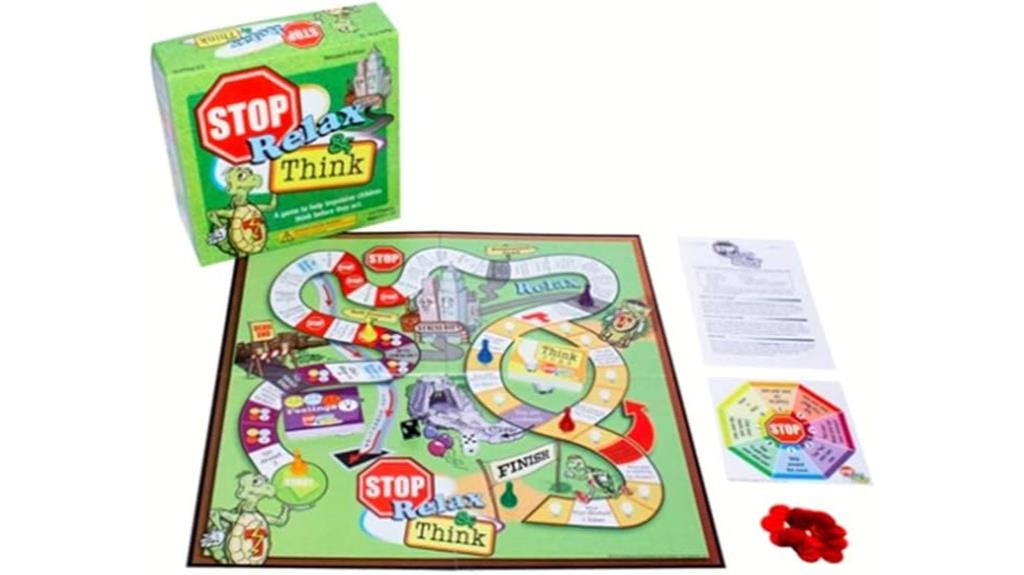
“Stop, Relax & Think” stands out as an ideal game for helping impulsive children develop self-regulation skills, especially those aged 6 to 12. This therapeutic board game encourages kids to pause, breathe, and reflect before acting. It guides children through sections like Feelings, Stop, Relax, and Think, helping them recognize emotions and practice calming techniques. The game promotes emotional awareness, problem-solving, and social skills while making therapy engaging. Designed for individual or group use, it’s a versatile tool that fosters impulse control and communication—key skills for children learning to manage their impulses effectively.
Best For: children aged 6-12 who need support in developing self-regulation, emotional awareness, and impulse control, especially those with impulsive tendencies.
Pros:
- Engages children in meaningful discussions about feelings and behaviors.
- Incorporates relaxation and problem-solving techniques to promote emotional regulation.
- Suitable for both individual and group therapy, classroom, and family settings.
Cons:
- Some users find the price to be relatively high for the product’s content.
- Certain questions and content may be more appropriate for older children, requiring adult assistance for younger players.
- Limited to a maximum of six players, which may restrict larger group activities.
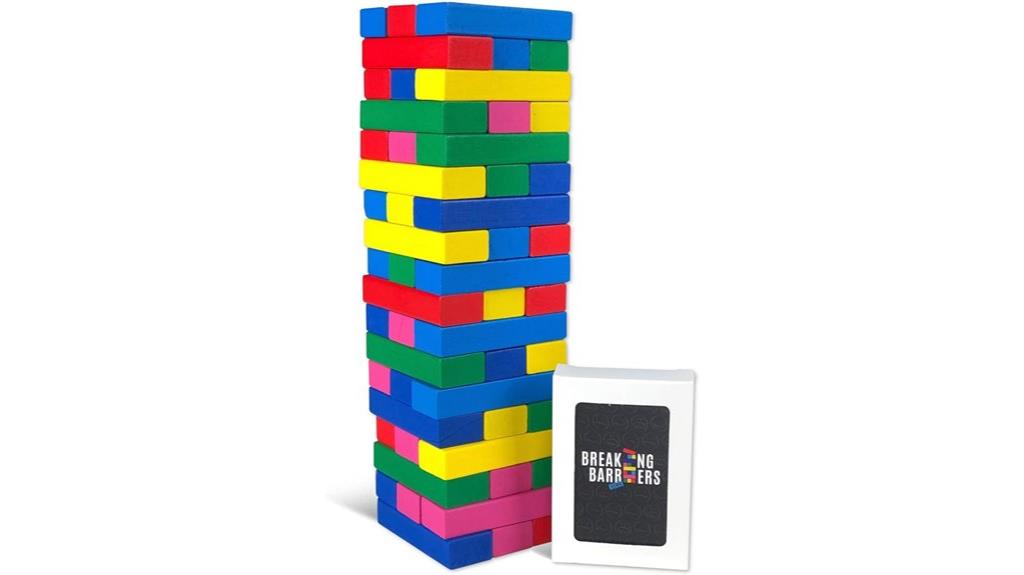
Breaking Barriers Down stands out as an excellent choice for therapists, educators, and families seeking to improve children’s social and emotional skills. This interactive game encourages open conversations about emotions like anger, sadness, and joy, helping kids build emotional awareness and regulation. With 208 questions, it’s versatile for group therapy, classroom activities, or family nights. Made of smooth plastic blocks, the game is easy to carry and set up, fostering trust and rapport in a fun, engaging way. Many users praise its ability to reduce vulnerability, boost self-esteem, and enhance social skills—making it a powerful tool for emotional growth.
Best For: therapists, educators, and families seeking an engaging, effective tool to promote emotional understanding and social skills in children and teens.
Pros:
- Encourages open dialogue about emotions, fostering emotional awareness and regulation.
- Versatile for use in therapy, classroom activities, and family game nights.
- Portable and easy to set up, making it convenient for various settings.
Cons:
- Painted plastic blocks can be slippery, making stacking slightly challenging.
- Some blocks may be less sturdy than traditional wooden pieces.
- A few cards may require adult supervision to ensure appropriateness for younger children.
Feelings Builder Therapy Games for Kids & Teens
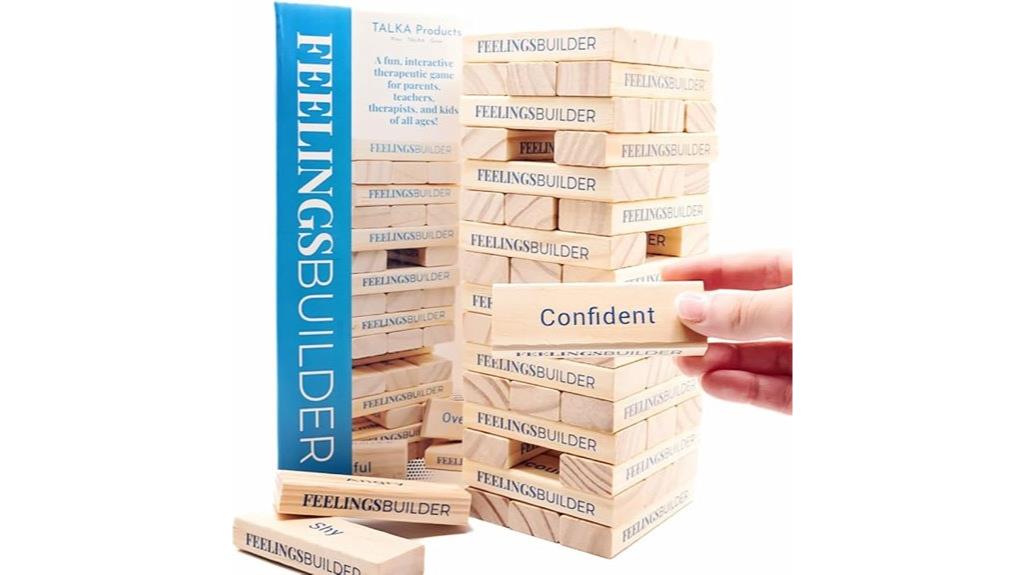
If you’re looking for a way to help kids and teens express and manage their emotions effectively, Feelings Builder Therapy Games stand out as a top choice. This engaging tumbling tower game promotes emotional awareness, self-regulation, and impulse control. Trusted by therapists, teachers, and parents, it’s used in various settings to reduce anxiety, manage anger, and build coping skills. Its versatile design helps users identify, label, and discuss feelings, enhancing emotional intelligence and social skills. Whether for therapy, classroom activities, or family fun, Feelings Builder fosters emotional resilience and connection across all ages.
Best For: parents, teachers, and therapists seeking an engaging tool to help children and teens develop emotional awareness, regulation, and social skills through fun and interactive play.
Pros:
- Promotes emotional intelligence, self-regulation, and impulse control in a playful way
- Versatile for use in therapy, classrooms, and family activities
- High-quality, engaging design that encourages communication and emotional vocabulary building
Cons:
- Recommended for ages 8 and up, may not be suitable for younger children without supervision
- Made in China, which may be a concern for those seeking locally produced toys
- Some users may need additional guidance to maximize its therapeutic potential
Lupash CBTiger Therapy Games for Kids
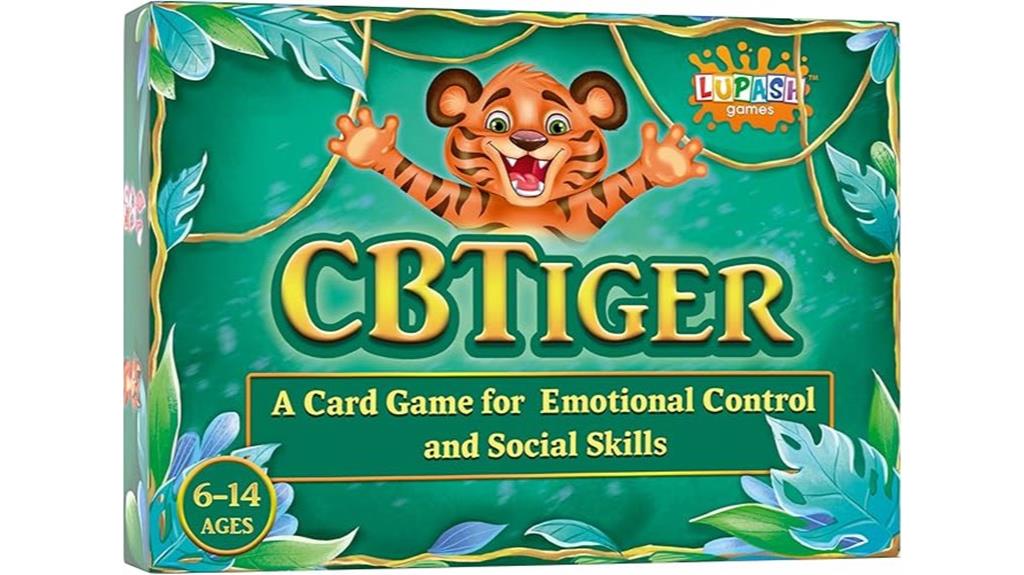
Lupash CBTiger Therapy Games for Kids stands out as an excellent tool for therapists, parents, and educators seeking to help children develop emotional awareness and regulation. Created by therapist Dana Lupash, the game promotes emotional expression, social skills, and anger management through engaging, colorful visuals. It includes 14 emotions like Happy, Sad, Angry, and Confident, encouraging kids to recognize and discuss their feelings. Made from durable materials, it’s suitable for therapy, classrooms, or home use. Many users praise its ability to foster emotional intelligence in children aged 6 and up, making it a versatile and effective addition to social-emotional learning strategies.
Best For: therapists, parents, and educators seeking an engaging, effective tool to enhance children’s emotional awareness, regulation, and social skills.
Pros:
- Colorful, engaging visuals that appeal to children aged 6 and up
- Supports cognitive-behavioral therapy techniques, especially TF-CBT
- Durable, portable design suitable for multiple settings including therapy, classroom, and home
Cons:
- May require facilitation or adaptation for younger children or less experienced parents
- Some users find it more effective when used with guided questions, which may need additional preparation
- Limited to 14 emotions, which might not cover the full spectrum of children’s feelings
Mindfulness Therapy Game for Kids, Teens & Adults
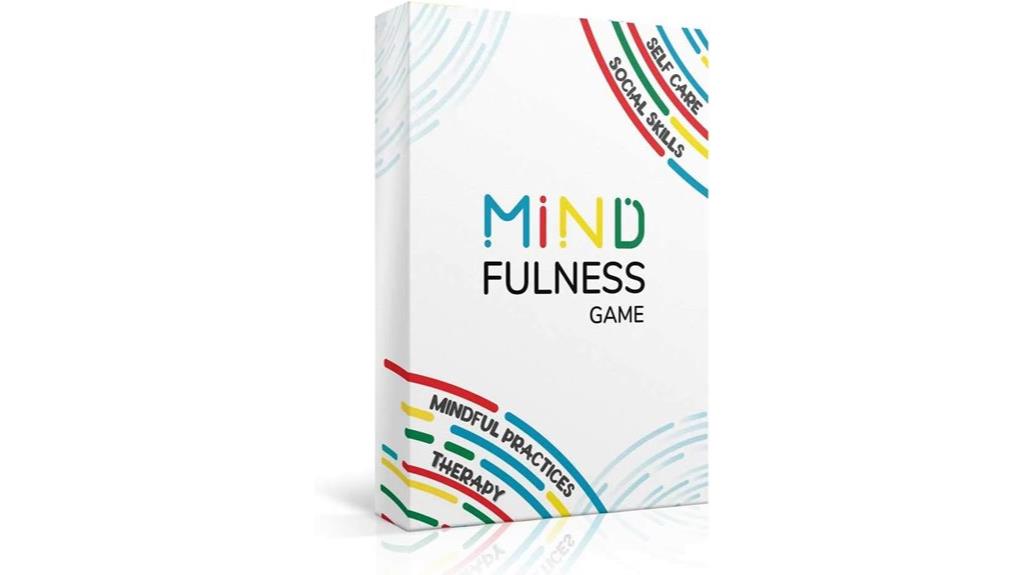
The Mindfulness Therapy Game by Arcia stands out as an excellent choice for anyone seeking to enhance emotional well-being across all ages, from kids to adults. I’ve seen how it effectively teaches social skills, self-care, mindfulness, and emotional regulation through engaging cards designed for various age groups. Created by experienced professionals, it promotes stress reduction, focus, and self-esteem while supporting mental health recovery. Whether in therapy, classrooms, or family settings, this versatile game encourages relaxation, self-awareness, and coping skills, making it an invaluable tool for fostering emotional resilience in a fun and accessible way for everyone.
Best For: individuals of all ages seeking to improve emotional regulation, social skills, and stress management through engaging, therapeutic activities.
Pros:
- Versatile for kids, teens, and adults in various settings such as therapy, classrooms, and families
- Durable, high-quality cards with engaging designs that withstand repeated use
- Supports a wide range of mental health goals including stress reduction, anxiety relief, and self-esteem building
Cons:
- May require some guidance for optimal use, especially for younger children or first-time users
- Not a standalone treatment; best used as a complementary tool alongside other therapies
- The set may be less effective without active facilitation or instruction from a trained professional
You Know Social Skills and Therapy Games

Looking for a game that effectively enhances social skills and emotional intelligence? “You Know” stands out as a versatile therapy and social skills game perfect for therapists, educators, and families alike. With 108 cards, it promotes communication, rapport, and meaningful conversations for 2-6 players aged 7 and up. The game encourages reflection on strengths, values, and relationships, making it ideal for therapy sessions, classrooms, or family game nights. Its familiar Uno-style design makes it engaging and adaptable across ages. Recognized for its positive impact, “You Know” helps build confidence, reduce anxiety, and improve social awareness in a fun, approachable way.
Best For: therapists, educators, and families seeking an engaging tool to develop social skills, emotional intelligence, and meaningful communication across various age groups.
Pros:
- Promotes positive social interaction and self-esteem in children, teens, and adults
- Versatile for use in therapy, classrooms, camps, and family settings
- Engaging Uno-style design makes learning fun and approachable
Cons:
- Some users find the cards thin and prone to sliding, affecting durability
- Questions can sometimes be abstract, negative, or repetitive, requiring modifications
- The price point may be considered high for some consumers
Totem Feel-Good Team Building and Therapy Game
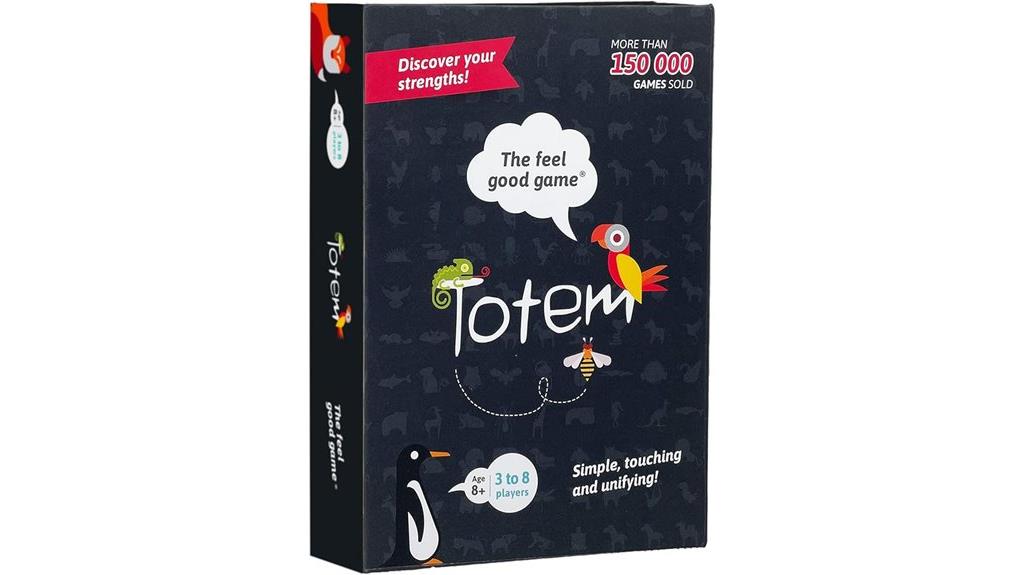
If you’re seeking a game that fosters meaningful connections and supports mental health, Totem Feel-Good Team Building and Therapy Game stands out as an ideal choice. It encourages self-discovery, reflection, and personal growth while enhancing mindfulness and social-emotional skills for all ages. Designed for families, groups, and professionals, it promotes empathy, trust, and adaptability through engaging conversations. The game’s inclusive philosophy eliminates losers, focusing on shared learning and development. Whether in therapy, education, or team-building settings, Totem helps participants connect deeper, express themselves openly, and build stronger relationships—making it a powerful tool for mental fitness.
Best For: families, educators, therapists, and team leaders seeking to foster emotional connection, self-awareness, and collaboration in a supportive, inclusive environment.
Pros:
- Promotes self-discovery, mindfulness, and emotional regulation for all ages.
- Facilitates meaningful conversations and deeper connections among participants.
- Versatile for use in therapy, education, and team-building settings to enhance social-emotional skills.
Cons:
- May require facilitator guidance for optimal engagement in some groups.
- The game’s focus on positivity might limit addressing complex or deeply rooted issues directly.
- Not designed for competitive play, which could be less appealing for those seeking competitive or high-energy activities.
Starter Edition Fitness Board Game

For those seeking a fun, versatile way to stay active at home, the Starter Edition Fitness Board Game offers an ideal solution. It combines entertainment with full-body workouts, making exercise engaging and social. Setting up is a breeze—no equipment needed, just roll, move, and exercise. Perfect for group sessions, it fosters shared fitness experiences that everyone can enjoy. Its versatility means you can try different routines each time, keeping workouts fresh. Whether at home, in a gym, or outdoors, it’s portable and easy to use. Suitable for all fitness levels, this game makes staying active simple, fun, and accessible for everyone.
Best For: individuals or groups seeking a fun, versatile, and social way to stay active at home, in gyms, or outdoors with minimal setup required.
Pros:
- Combines entertainment with effective full-body workouts, making exercise enjoyable.
- No equipment needed; easy to set up and play anywhere, anytime.
- Suitable for all fitness levels, encouraging inclusive and accessible fitness experiences.
Cons:
- May require multiple players for the full social and engaging experience.
- Limited to activities that can be incorporated into a board game format, possibly restricting workout variety.
- As a game-based workout, it might not replace more intense or specialized training routines for advanced athletes.
Da Vincis Room Don’t Go Bananas CBT Therapy Game for Kids
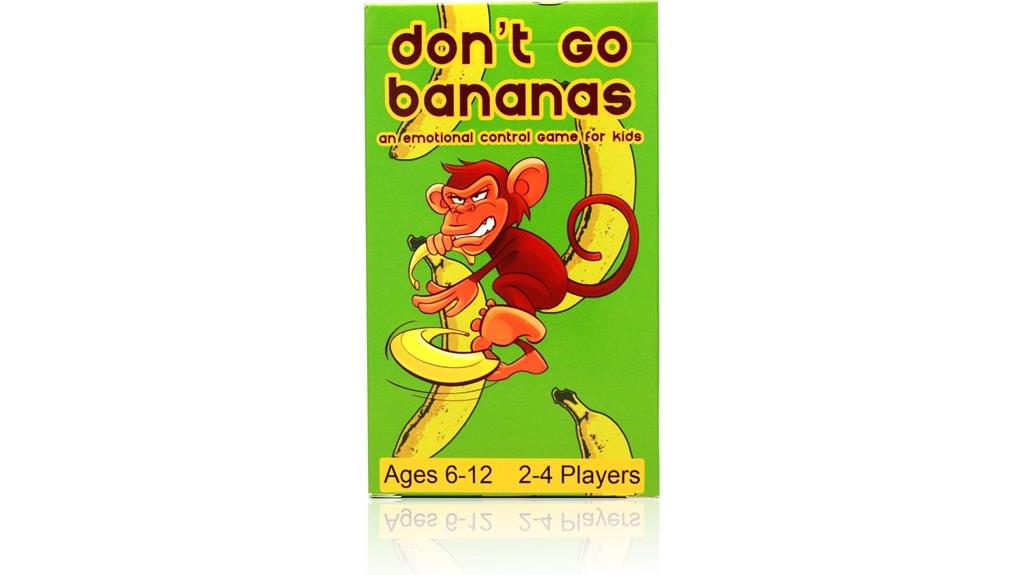
Da Vincis Room Don’t Go Bananas CBT Therapy Game for Kids stands out as an excellent tool for children aged 6 to 12 who are learning to manage their emotions through social skills development. This game is based on the ABCD Model of Cognitive Behavioral Therapy, helping kids identify triggers, beliefs, reactions, and ways to change thought patterns. It targets emotions like anger, sadness, worry, fear, and jealousy, encouraging reflection and discussion. Designed for 2-4 players, it promotes cooperation and social interaction with engaging visuals. Suitable for classroom or home, it offers a structured, playful approach to emotional regulation, making it a valuable resource for both therapists and parents.
Best For: children aged 6-12, parents, teachers, and therapists seeking a playful, engaging tool to help kids develop emotional regulation and social skills.
Pros:
- Engages children with fun visuals and interactive gameplay that encourages emotional reflection.
- Promotes social skills like cooperation, turn-taking, and sharing in a non-threatening way.
- Flexible for use in both classroom and home environments, adaptable to various age groups.
Cons:
- Rules are sometimes poorly written, leading to confusion and the need for house rules.
- Questions may become repetitive, reducing engagement over time.
- Its confrontational approach might be unsuitable for children with ASD, PDA, or those sensitive to conflict or distress.
Coping Skills Cards for Anxiety & Stress Relief
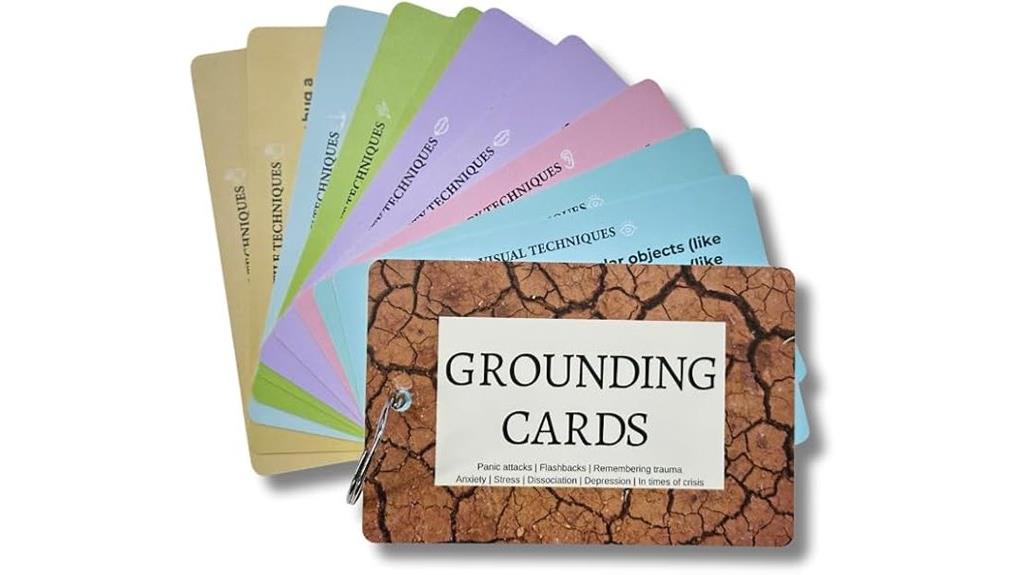
Coping Skills Cards stand out as an essential tool for anyone seeking immediate relief from anxiety and stress. I’ve found them incredibly effective during tough moments, offering quick access to over 20 practical techniques. These cards include visual, tactile, and sensory activities that help redirect my focus and promote calmness. Made from durable waterproof PVC, they’re portable, easy to carry, and perfect for on-the-go support. Whether I need to manage panic attacks, flashbacks, or emotional distress, these cards give me immediate tools to regain control. They’re ideal for self-care, therapy, or as thoughtful gifts for loved ones facing mental health challenges.
Best For: individuals of all ages seeking immediate, practical tools to manage anxiety, stress, and emotional crises on-the-go.
Pros:
- Includes over 20 diverse, multi-sensory coping techniques tailored for quick relief
- Made from durable, waterproof PVC, ensuring long-lasting use and portability
- Compact size (65 x 100 mm) with keyring attachment options for easy access during emergencies
Cons:
- Limited to 10 cards, which may not cover all personal coping preferences
- Not a comprehensive therapy solution but a supplementary tool
- Might require guidance or familiarity for maximum effectiveness for some users
ARTAGIA Social Skills and Therapy Game for Adults and Teens
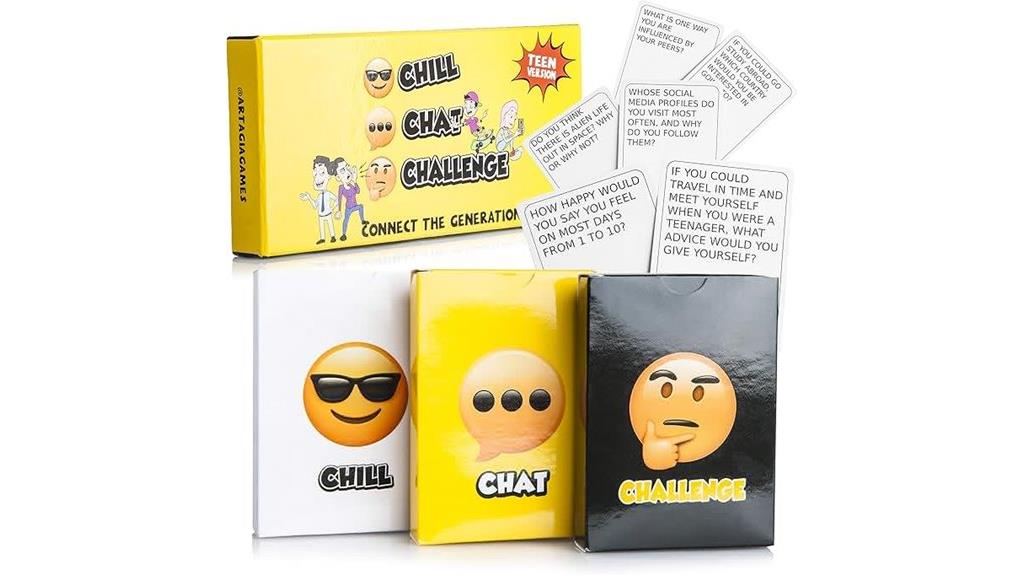
If you’re seeking a versatile game that promotes meaningful conversations and strengthens relationships, ARTAGIA Social Skills and Therapy Game is an excellent choice for adults and teens. It features 150 diverse cards covering topics like family, current events, and personal challenges, making it perfect for various settings such as family nights, therapy, or social gatherings. With three decks catering to different moods and depths, it encourages open dialogue and self-reflection. Endorsed by therapists, it helps build trust, boost emotional well-being, and improve communication skills. Its durable design and straightforward instructions make it easy to set up and enjoy, fostering deeper connections across generations.
Best For: anyone seeking to enhance communication, build trust, and foster meaningful conversations in family, therapy, or social settings for teens and adults.
Pros:
- Endorsed by therapists, ensuring a therapeutic and effective tool for emotional growth.
- Includes diverse topics and adjustable decks for different moods and age groups, offering versatility.
- Durable, easy-to-understand design with clear instructions, making setup quick and straightforward.
Cons:
- Higher price point compared to other social game options.
- Some illustrations and questions may not reflect all family demographics or backgrounds.
- Limited digital content, with uncertain availability of the free digital game after scanning the code.
Overcome Addiction Recovery Questions Card Game
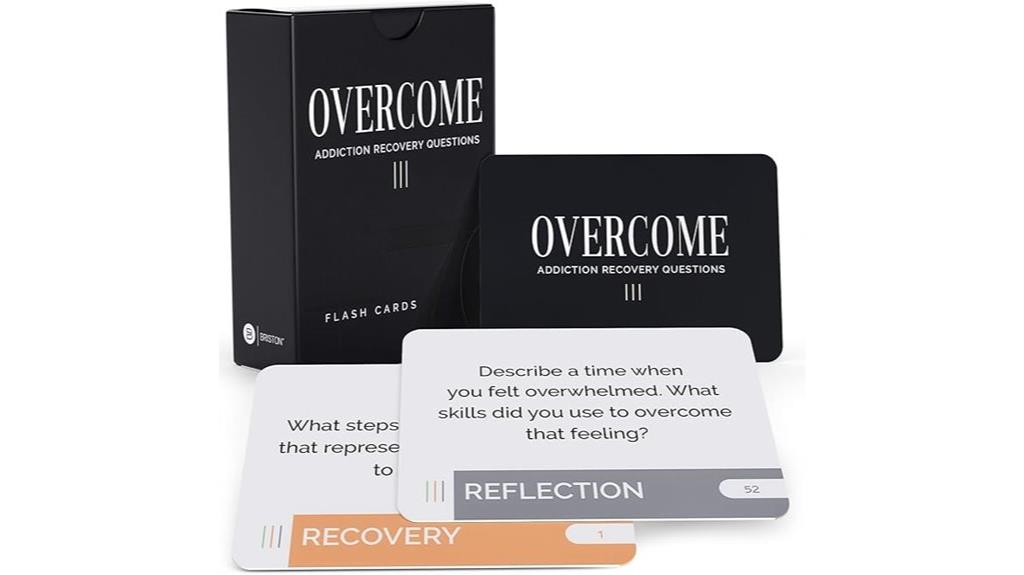
The Overcome Addiction Recovery Questions Card Game is an excellent tool for therapists, support group leaders, and individuals in recovery who want to facilitate honest conversations about sobriety and mental health. With 70 thoughtfully designed cards, it encourages open dialogue on triggers, coping strategies, and shared experiences. The durable, user-friendly design makes it accessible for all recovery stages and settings, from therapy sessions to casual group chats. By promoting self-awareness and emotional insight, these cards help build trust, foster resilience, and support relapse prevention. Many professionals and users find it boosts engagement and deepens understanding, making recovery discussions more meaningful and supportive.
Best For: therapists, support group leaders, and individuals in recovery seeking to facilitate honest, meaningful conversations about sobriety and mental health.
Pros:
- Promotes open dialogue, honesty, and self-awareness in recovery settings
- Durable, water-resistant design ensures longevity with frequent use
- Versatile and easy to incorporate into therapy, support groups, or personal reflection
Cons:
- Some users note that discovery cards are not included, only recovery and reflection cards
- May require facilitator guidance to maximize engagement and discussion depth
- Limited to 70 cards, which might not cover every specific topic or scenario
Factors to Consider When Choosing Mental Fitness Board Games
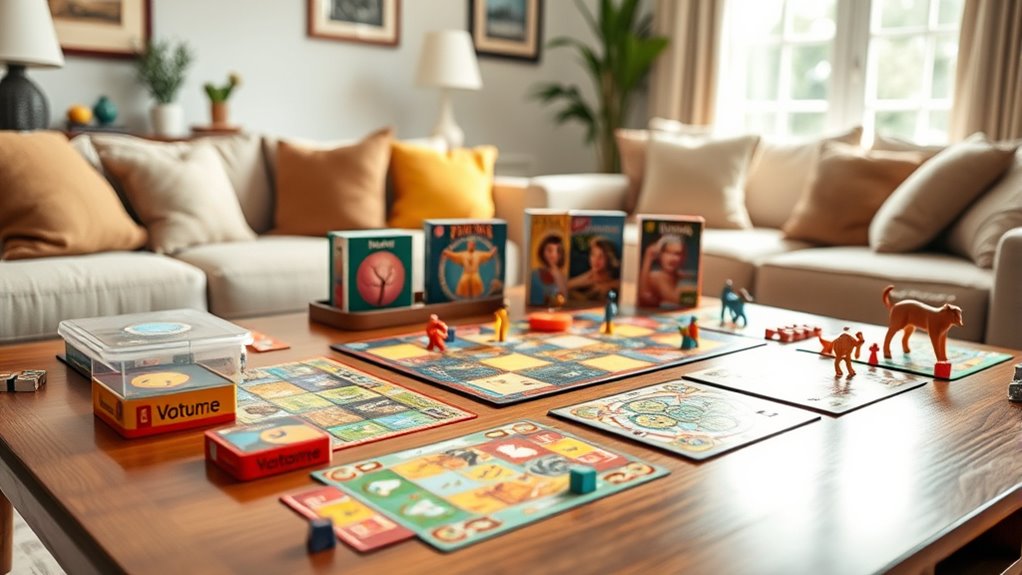
When selecting a mental fitness board game, I consider factors like age appropriateness, therapeutic focus, and how engaging it is. I also think about portability and storage, so it fits easily into my routine, and whether the content aligns with my goals. These points help me find games that are effective, enjoyable, and practical for my needs.
Age Appropriateness
Choosing the right mental fitness board game depends heavily on the age of the players. It’s crucial to check that the game is suitable for the intended age group, which is usually indicated on the packaging or description. Consider the cognitive and emotional development levels to pick a game that’s neither too simple nor too complex. For children aged 5-12, look for games with age-appropriate themes, language, and content to keep them engaged and safe. For teens and adults, select games that challenge their social, emotional, or mental skills at an appropriate difficulty level. Also, be mindful of safety features, such as small parts or sensitive topics, to ensure the game is safe and suitable for their age.
Therapeutic Focus
Selecting a mental fitness board game with a therapeutic focus means considering how well it supports emotional regulation, social skills, and mental health awareness. I look for games that include prompts or activities designed to foster self-reflection, emotional expression, and coping strategies. The game’s effectiveness depends on how well it aligns with specific mental health goals, like reducing anxiety or enhancing communication. I also check if it’s developed or endorsed by mental health professionals to ensure it meets clinical or developmental needs. Additionally, I prefer games that incorporate evidence-based techniques such as CBT, mindfulness, or social-emotional learning. These elements help maximize therapeutic benefits and ensure the game supports meaningful mental health growth while being engaging and safe for players.
Engagement Level
Engagement level plays a vital role in the effectiveness of mental fitness board games because it directly influences how much players stay involved and benefit from the activities. An engaging game captures attention through interactive gameplay, stimulating questions, or fun activities that challenge the mind. High engagement is often reflected in positive feedback, frequent replayability, and active participation. Games that mix formats like storytelling, problem-solving, or physical movement tend to keep players interested longer. Visual appeal also matters; bright colors and attractive graphics draw players in and encourage continued play. Incorporating elements of novelty and challenge motivates players to stay involved and endeavor for self-improvement. Ultimately, a highly engaging game makes mental workouts enjoyable and sustainable over time.
Portability & Storage
When considering mental fitness board games, portability and storage are key factors that can influence how and when you enjoy them. I look at the size and weight to guarantee they’re easy to carry in a bag or stored in a small space. Compact designs or cases make packing and unpacking quick, perfect for on-the-go use. Many games come with dedicated containers or bags, helping keep components organized and protected. Durability of packaging is also important, especially if you plan to transport the game frequently. I prefer games with minimal or space-efficient components to reduce bulk and make storage simple. By choosing games that prioritize portability and easy storage, I can enjoy mental workouts anytime, anywhere without hassle.
Content Relevance
Choosing the right mental fitness board game requires careful attention to content relevance to guarantee it meets the players’ needs. I make sure the game’s themes align with the age group and developmental stage of the players, making it engaging and appropriate. It’s essential that the questions and topics relate to current social, emotional, or cognitive skills we aim to strengthen. I also look for content that promotes positive values, inclusivity, and diversity, creating a respectful and welcoming environment. Additionally, I check if the game covers a variety of scenarios and themes to address multiple aspects of mental fitness. Finally, I verify that the content is evidence-based or developed by professionals to ensure accuracy and beneficial results. This careful consideration ensures the game is both meaningful and effective.
Ease of Use
Selecting a mental fitness board game that’s easy to use can make a significant difference in how effectively players engage and benefit from the experience. Clear, simple instructions allow players to grasp gameplay quickly without needing extensive guidance, keeping frustration at bay. Well-designed onboarding materials, like quick-start guides or visual cues, boost usability, especially for newcomers. Games that require minimal setup or equipment are more accessible and encourage regular play across different settings, from home to travel. Intuitive mechanics that don’t involve complex rules or strategies help players focus on learning or social interaction rather than deciphering instructions. Ultimately, ease of use is measured by how fast players become engaged and start participating with minimal confusion or frustration, making the game more enjoyable and beneficial.
Frequently Asked Questions
How Do Mental Fitness Board Games Enhance Cognitive Flexibility?
Mental fitness board games enhance cognitive flexibility by challenging me to think in new ways and adapt quickly. They require me to switch strategies, consider different perspectives, and solve problems on the fly. Playing these games keeps my mind agile, encouraging me to break out of routines and develop better mental adaptability. I find that the more I play, the easier it becomes to think creatively and adjust to new situations in everyday life.
Can These Games Improve Emotional Regulation Skills Effectively?
This question hits close to home because I’ve seen firsthand how mental fitness games can transform emotional regulation skills. They challenge us to stay calm under pressure, recognize emotions, and adapt strategies—like a mental gym for your feelings. I genuinely believe these games can be extremely effective, even more than traditional methods, because they make practicing emotional control engaging and memorable. Give them a try, and you’ll notice a real difference!
Are There Age-Specific Recommendations for Optimal Benefits?
You’re wondering if different ages benefit more from specific games. I believe age-specific recommendations can maximize benefits because developmental stages influence how we engage with and learn from games. For kids, simpler, color-rich games boost cognitive skills, while adults might prefer strategic or memory challenges. Tailoring game choices guarantees that each age group gets the most mental stimulation, making the experience both fun and effective at improving brainpower across all ages.
How Do Game Themes Influence Engagement and Learning Outcomes?
Did you know that engaging themes can boost a game’s effectiveness by up to 30%? I believe game themes markedly influence engagement and learning outcomes because they tap into our interests and emotions. When I pick a game aligned with my passions, I stay more focused and absorb more. Themes make learning fun and relatable, turning complex skills into enjoyable challenges that stick with us longer.
What Role Do Social Interactions Play in Mental Fitness Games?
Social interactions are key in mental fitness games because they boost motivation, engagement, and learning. When I play with others, I feel more connected and motivated to think critically and strategize together. These interactions challenge my communication skills and help me learn from different perspectives. I believe that social elements make the game more enjoyable and effective, encouraging consistent mental exercise and fostering a sense of community.
Conclusion
So, are you ready to open your brain’s full potential? These games aren’t just fun—they’re powerful tools to boost your mental fitness in surprising ways. But there’s one game I haven’t mentioned yet, one that could change everything. Curious? Stay tuned—what’s coming next might just be the most important game of all. Trust me, you won’t want to miss what’s around the corner.
